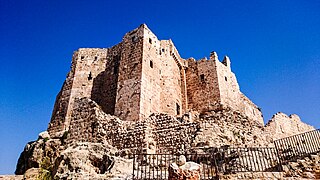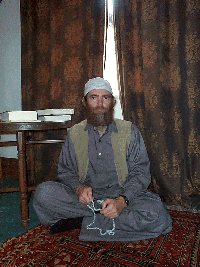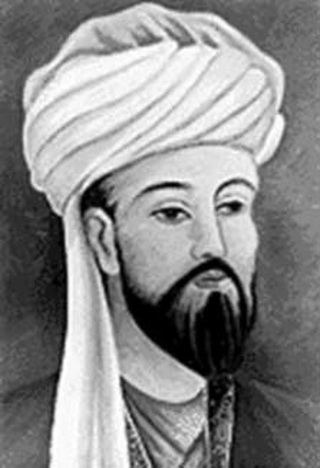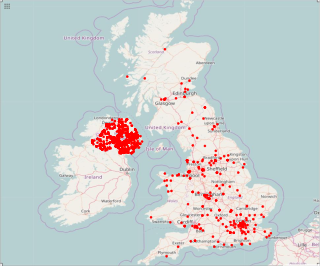
The Order of Assassins or simply the Assassins were a Nizari Isma'ili order that existed between 1090 and 1275 AD, founded by Hasan-i Sabbah.

Bernard Lewis, was a British American historian specialized in Oriental studies. He was also known as a public intellectual and political commentator. Lewis was the Cleveland E. Dodge Professor Emeritus of Near Eastern Studies at Princeton University. Lewis's expertise was in the history of Islam and the interaction between Islam and the West.

Hasan-i Sabbah was a religious and military leader, founder of the Nizari Ismaili state. He was also the founder of the intelligence team known as the Assassins, which consisted of a group of specially trained spies. He has been known in the West as the Old Man of the Mountain since Marco Polo, as he captured a mountain fortress called Alamut. Throughout his life he engaged in many academic subjects. Besides religious and military leadership, he was experienced in mathematics, astronomy, and philosophy.
Islamic terrorism refers to terrorist acts with religious motivations carried out by fundamentalist militant Islamists and Islamic extremists.

David Wulstan Myatt, also known by the pseudonym Abdulaziz ibn Myatt al-Qari, is a British author, religious leader, far-right and former Islamist militant, most notable for allegedly being the political and religious leader of the White nationalist theistic Satanist organization Order of Nine Angles (ONA) from 1974 onwards. He is also the founder of Numinous Way and a former Muslim.

Fouad A. Ajami was a MacArthur Fellowship winning, Lebanese-born American university professor and writer on Middle Eastern issues. He was a senior fellow at Stanford University's Hoover Institution.
Walter Ze'ev Laqueur was a German-born American historian, journalist and political commentator. He was an influential scholar on the subjects of terrorism and political violence.
Takfiri is an Arabic and Islamic term denoting a Muslim who excommunicates one of his/her coreligionists, i.e. who accuses another Muslim of being an apostate.

Al-Ahbash, also known as the Association of Islamic Charitable Projects is a neo-traditionalist Sufi religious movement and, in Lebanon, political party, which was founded in the mid-1980s. The group follow the teachings of Ethiopian scholar Abdullah al-Harari. Due to the group's origins and activity in Lebanon, the Ahbash have been described as the "activist expression of Lebanese Sufism."

Jihadism is a neologism for militant Islamic movements that are perceived as existentially threatening to the West. It has been applied to various insurgent Islamic extremist, militant Islamist, and terrorist individuals and organizations whose ideologies are based on the Islamic notion of jihad. It has also been applied to various Islamic empires in history, such as the Umayyad Caliphate and the Ottoman Empire, who extensively campaigned against non-Muslim nations in the name of jihad.
The Arab Mind is a non-fiction cultural psychology book by Hungarian-born, Jewish cultural anthropologist and Orientalist Raphael Patai. He also wrote The Jewish Mind. The book advocates a tribal-group-survival explanation for the driving factors behind Arab culture. It was first published in 1973, and later revised in 1983. A 2007 reprint was further "updated with new demographic information about the Arab world".

Islamic extremism, Islamist extremism, or radical Islam, is used in reference to extremist beliefs and behaviors which are associated with the far-right ideology in Islam. These are controversial terms with varying definitions, ranging from academic understandings to the idea that all ideologies other than Islam have failed and are inferior to Islam. These terms can also be used in reference to other sects of Islam that do not share such beliefs. Political definitions of Islamic extremism include the one which is used by the government of the United Kingdom, which understands Islamic extremism as any form of Islam that opposes "democracy, the rule of law, individual liberty and mutual respect and tolerance of different faiths and beliefs". In 2019, the U.S. Institute for Peace released an important report on extremism in fragile states that developed recommendations focused on adopting a shared understanding, operationalize a prevention framework, and rallying the international community.

Rashid al-Din Sinan also known as the Old Man of the Mountain, was a da'i (missionary) and leader of the Syrian branch of the Nizari Isma'ili state from 1162 until his death in 1193. He was also a prominent figure in the history of the Crusades.

Terrorism in the United Kingdom, according to the Home Office, poses a significant threat to the state. There have been various causes of terrorism in the UK. Before the 2000s, most attacks were linked to the Northern Ireland conflict. In the late 20th century there were also attacks by Islamic terrorist groups. Since 1970, there have been at least 3,395 terrorist-related deaths in the UK, the highest in western Europe. The vast majority of the deaths were linked to the Northern Ireland conflict and happened in Northern Ireland. In mainland Great Britain, there were 430 terrorist-related deaths between 1971 and 2001. Of these, 125 deaths were linked to the Northern Ireland conflict, and 305 deaths were linked to other causes, including 270 in the Lockerbie bombing. Since 2001, there have been almost 100 terrorist-related deaths in Great Britain.

A suicide attack is any violent attack, usually entailing attackers detonating an explosive, where any attackers have accepted their own death as a direct result of the attacking method used. Suicide attacks have occurred throughout history, often as part of a military campaign, and more recently as part of Islamic terrorist campaigns. Although generally not regulated under international law by themselves, many suicide attacks violate international laws of war such as perfidy or targeting civilians.
In the political aspects of Islam, political quietism in Islam is the religiously-motivated withdrawal from political affairs or skepticism that mere mortals can establish a true Islamic government. It is the opposite of political Islam, which holds that the Islamic religion and politics are inseparable. It has also been used to describe Muslims who believe that Muslims should support Islamic government, but that it is "forbidden to rebel against a ruler"; and Muslims who support Islamic government at the right time in the future, when a consensus of Islamic scholars or twelfth imam call for it. The Sunnis of Saudi Arabia and Salafis are sometimes described as having "quietist" and "radical" wings.
Islamism has existed in the United Kingdom since the 1970s, and has become widely visible and a topic of political discourse since the beginning of the 21st century.











